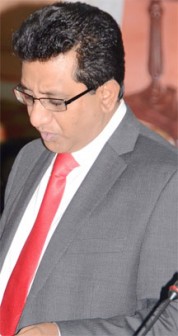Who should foot the bill? The Caribbean Community (CARICOM) or the offending state?
This is the question being asked as the Caribbean Court of Justice (CCJ) in being increasingly utilized and with that, the possibility of judgments against CARICOM. The issue is one of several “fundamental” topics that the CARICOM Secretariat is seeking advice on and was recently discussed during a meeting of the Legal Affairs Committee when it met at the Secretariat here on February 29.
Attorney-General and Minister of Legal Affairs, Anil Nandlall told Stabroek News that the committee was asked to advise on the approach to be taken when judgments are rendered against CARICOM at the CCJ. He pointed out that on certain matters the community can be named in the action taken but the question is whether CARICOM as a whole should foot the bill or the offending state alone should bear the cost.

CARICOM has been taken to the CCJ on at least one occasion. In August 2009, the CCJ dismissed a claim by Trinidad Cement Limited (TCL) against CARICOM for suspending the Common External Tariff (CET) on cement imports, but also set criteria for the Secretary General to follow in future considerations on the issue having found a procedural flaw in the case. TCL had not claimed damages in the action but was seeking relief to quash and revoke the decision of the Secretary-General. The court dismissed the other claims by TCL for relief but ordered that CARICOM should bear one half of the costs of TCL.
TCL had challenged two decisions of the Community which had resulted in authorisation being granted to suspend the CET on imports of grey cement into certain countries. The first of the two decisions was made by the Secretary-General on or about 23rd September, 2008. It authorised suspension by Jamaica from 10th Septem-ber, 2008. The quantity of grey cement in respect of which that suspension was sought and granted was 240,000 metric tonnes. The second decision challenged was made by the CARICOM Council for Trade and Econo-mic Development (COTED) at its 26th Meeting held in Guyana on 24th November, 2008. At that Meeting COTED authorised suspension of the CET on cement for one year for the Member States of Antigua and Barbuda, Dominica, Grenada, Saint Lucia, St. Kitts and Nevis, St. Vincent and the Grena-dines and Suriname. In each case the authorisation granted was for suspension of the CET for one year.
Nandlall said that they felt that this was something that should be discussed more fully at the level of the CARICOM Heads of Govern-ment for them to subsequently give directions to the Committee.
Unanimity
Another issue that advice was sought on was the unanimity rule for certain decisions to be implemented by CARICOM. Nandlall said that the Committee was asked to prepare an advisory on how to revise the existing mechanisms in relation to amending the Treaty of Chaguaramas. He explained that currently, unanimity of the member states is required before certain actions could be taken. “It is felt that that is a long slow process,” he said. “We were asked to review the position to see whether we should retain it or change it,” he said.
The AG noted that one of the ways that this could be changed is for decisions to require only a majority rather than unanimity with member states who do not initially agree, subsequently being able to opt-in. No decision was made at the meeting.
“We felt it was too much of a fundamental decision to be conclusively decided by the Committee and we recommended that the Heads (of Governments) deliberate further on the request and more specific directions be handed to us,” Nandlall said.
He noted that wide consultations have to be done before decisions are made. The issues were not discussed at the just concluded Heads of Government meet in Suriname, the minister said. The Committee meets again in September and hopefully by then, they would have received the information required, Nandlall said. (Gaulbert Sutherland)

